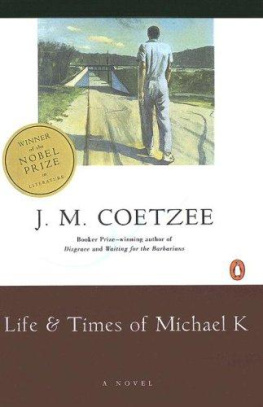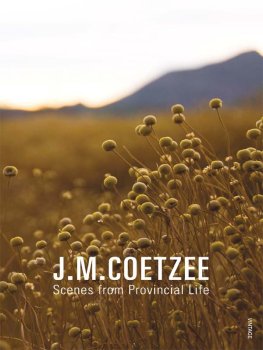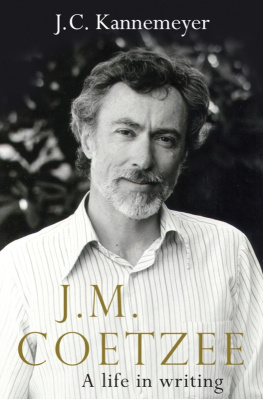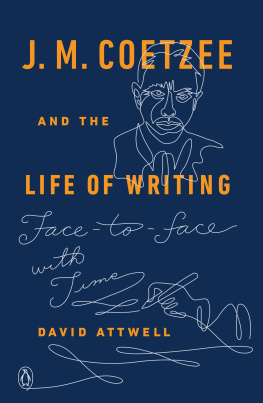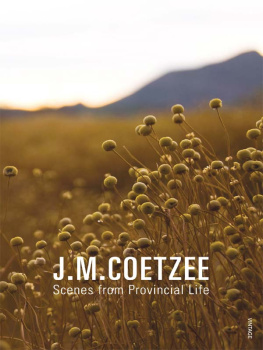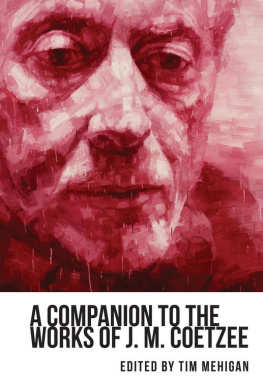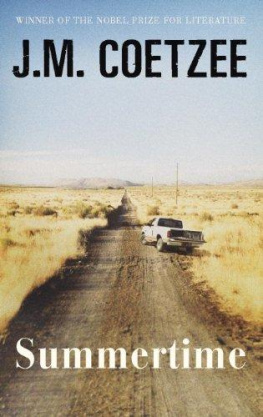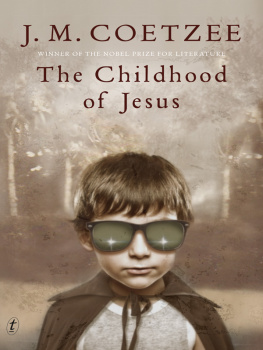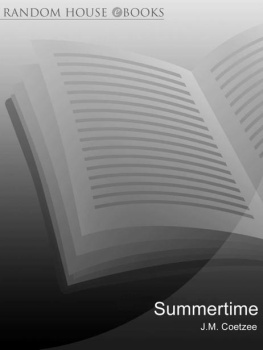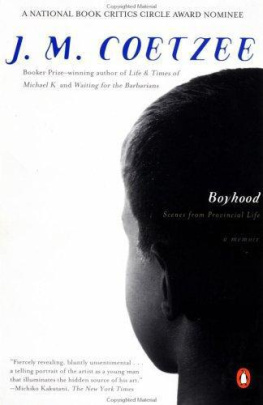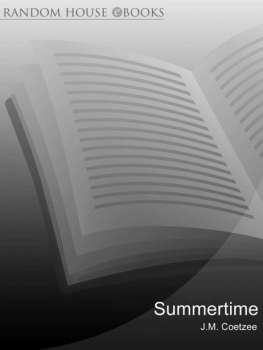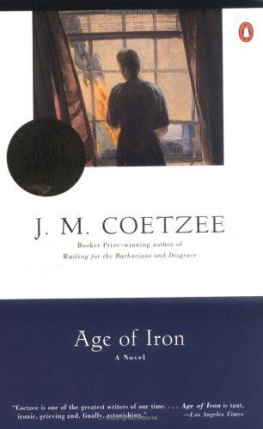J.M.Coetzee - Youth: Scenes From Provincial Life II
Here you can read online J.M.Coetzee - Youth: Scenes From Provincial Life II full text of the book (entire story) in english for free. Download pdf and epub, get meaning, cover and reviews about this ebook. genre: Detective and thriller. Description of the work, (preface) as well as reviews are available. Best literature library LitArk.com created for fans of good reading and offers a wide selection of genres:
Romance novel
Science fiction
Adventure
Detective
Science
History
Home and family
Prose
Art
Politics
Computer
Non-fiction
Religion
Business
Children
Humor
Choose a favorite category and find really read worthwhile books. Enjoy immersion in the world of imagination, feel the emotions of the characters or learn something new for yourself, make an fascinating discovery.
- Book:Youth: Scenes From Provincial Life II
- Author:
- Genre:
- Rating:3 / 5
- Favourites:Add to favourites
- Your mark:
- 60
- 1
- 2
- 3
- 4
- 5
Youth: Scenes From Provincial Life II: summary, description and annotation
We offer to read an annotation, description, summary or preface (depends on what the author of the book "Youth: Scenes From Provincial Life II" wrote himself). If you haven't found the necessary information about the book — write in the comments, we will try to find it.
Youth: Scenes From Provincial Life II — read online for free the complete book (whole text) full work
Below is the text of the book, divided by pages. System saving the place of the last page read, allows you to conveniently read the book "Youth: Scenes From Provincial Life II" online for free, without having to search again every time where you left off. Put a bookmark, and you can go to the page where you finished reading at any time.
Font size:
Interval:
Bookmark:
J.M. Coetzee
YOUTH
2002
Wer den Dichter will verstehenMuB in Dichters gehen.Goethe
ONE
He lives in a one-room flat near Mowbray railway station, for which he pays eleven guineas a month. On the last working day of each month he catches the train in to the city, to
Loop Street
, where A. B. Levy, property agents, have their brass plate and tiny office. To Mr B. Levy, younger of the Levy brothers, he hands the envelope with the rent. Mr Levy pours the money out onto his cluttered desk and counts it. Grunting and sweating, he writes a receipt. 'Voil, young man!' he says, and passes it over with a flourish.
He is at pains not to be late with the rent because he is in the flat under false pretences. When he signed the lease and paid A. B. Levy the deposit, he gave his occupation not as 'Student' but as 'Library Assistant,' with the university library as his work address.
It is not a lie, not entirely. From Monday to Friday it is his job to man the reading room during evening hours. It is a job that the regular librarians, women for the most part, prefer not to do because the campus, up on the mountainside, is too bleak and lonely at night. Even he feels a chill down his spine as he unlocks the back door and gropes his way down a pitch-dark corridor to the mains switch. It would be all too easy for some evildoer to hide in the stacks when the staff go home at five o'clock, then rifle the empty offices and wait in the dark to waylay him, the night assistant, for his keys.
Few students make use of the evening opening; few are even aware of it. There is little for him to do. The ten shillings per evening he earns is easy money.
Sometimes he imagines a beautiful girl in a white dress wandering into the reading room and lingering distractedly after closing time; he imagines showing her over the mysteries of the bindery and cataloguing room, then emerging with her into the starry night. It never happens.
Working in the library is not his only employment. On Wednesday afternoons he assists with first-year tutorials in the Mathematics Department (three pounds a week); on Fridays he conducts the diploma students in drama through selected comedies of Shakespeare (two pounds ten); and in the late afternoons he is employed by a cram school in Rondebosch to coach dummies for their Matriculation exams (three shillings an hour). During vacations he works for the Municipality (Division of Public Housing) extracting statistical data from household surveys. All in all, when he adds up the monies, he is comfortably off -- comfortably enough to pay his rent and university fees and keep body and soul together and even save a little. He may only be nineteen but he is on his own feet, dependent on no one.
The needs of the body he treats as a matter of simple common sense. Every Sunday he boils up marrowbones and beans and celery to make a big pot of soup, enough to last the week. On Fridays he visits Salt River market for a box of apples or guavas or whatever fruit is in season. Every morning the milkman leaves a pint of milk on his doorstep. When he has a surplus of milk he hangs it over the sink in an old nylon stocking and turns it into cheese. For the rest he buys bread at the corner shop. It is a diet Rousseau would approve of, or Plato. As for clothes, he has a good jacket and trousers to wear to lectures. Otherwise he makes old clothes last.
He is proving something: that each man is an island; that you don't need parents.
Some evenings, trudging along the
Main Road
in raincoat and shorts and sandals, his hair plastered flat by the rain, lit up by the headlights of passing cars, he has a sense of how odd he looks. Not eccentric (there is some distinction in looking eccentric), just odd. He grinds his teeth in chagrin and walks faster.
He is slim and looselimbed, yet at the same time flabby. He would like to be attractive but he knows he is not. There is something essential he lacks, some definition of feature. Something of the baby still lingers in him. How long before he will cease to be a baby? What will cure him of babyhood, make him into a man?
What will cure him, if it were to arrive, will be love. He may not believe in God but he does believe in love and the powers of love. The beloved, the destined one, will see at once through the odd and even dull exterior he presents to the fire that burns within him. Meanwhile, being dull and odd-looking are part of a purgatory he must pass through in order to emerge, one day, into the light: the light of love, the light of art. For he will be an artist, that has long been settled. If for the time being he must be obscure and ridiculous, that is because it is the lot of the artist to suffer obscurity and ridicule until the day when he is revealed in his true powers and the scoffers and mockers fall silent.
His sandals cost two shillings and sixpence a pair. They are of rubber, and are made somewhere in Africa, Nyasaland perhaps. When they get wet they do not grip the sole of the foot. In the Cape winter it rains for weeks on end. Walking along the
Main Road
in the rain, he sometimes has to stop to recapture a sandal that has slipped free. At such moments he can see the fat burghers of Cape Town chuckling as they pass in the comfort of their cars. Laugh! he thinks. Soon I will be gone!
He has a best friend, Paul, who like him is studying mathematics. Paul is tall and dark and in the midst of an affair with an older woman, a woman named Elinor Laurier, small and blonde and beautiful in a quick, birdlike way. Paul complains about Elinor's unpredictable moods, about the demands she makes on him. Nevertheless, he is envious of Paul. If he had a beautiful, worldly-wise mistress who smoked with a cigarette-holder and spoke French, he would soon be transformed, even transfigured, he is sure.
Elinor and her twin sister were born in England; they were brought to South Africa at the age of fifteen, after the War. Their mother, according to Paul, according to Elinor, used to play the girls off against each other, giving love and approval first to the one, then to the other, confusing them, keeping them dependent on her. Elinor, the stronger of the two, retained her sanity, though she still cries in her sleep and keeps a teddy-bear in a drawer. Her sister, however, was for a while crazy enough to be locked up. She is still under therapy, as she struggles with the ghost of the dead old woman.
Elinor teaches in a language school in the city. Since taking up with her, Paul has been absorbed into her set, a set of artists and intellectuals who live in the Gardens, wear black sweaters and jeans and rope sandals, drink rough red wine and smoke Gauloises, quote Camus and Garca Lorca, listen to progressive jazz. One of them plays the Spanish guitar and can be persuaded to do an imitation of cante hondo. Not having proper jobs, they stay up all night and sleep until noon. They hate the Nationalists but are not political. If they had the money, they say, they would leave benighted South Africa and move for good to Montmartre or the Balearic Islands.
Paul and Elinor take him along to one of their get-togethers, held in a bungalow on Clifton beach. Elinor's sister, the unstable one he has been told about, is among the company. According to Paul, she is having an affair with the owner of the bungalow, a florid-faced man who writes for the CapeTimes .
The sister's name is Jacqueline. She is taller than Elinor, not as fine-featured but beautiful nonetheless. She is full of nervous energy, chain-smokes, gesticulates when she talks. He gets on with her. She is less caustic than Elinor, for which he is relieved. Caustic people make him uneasy. He suspects they pass witticisms about him when his back is turned.
Jacqueline suggests a walk on the beach. Hand in hand (how did that happen?) in the moonlight, they stroll the length of the beach. In a secluded space among the rocks she turns to him, pouts, offers him her lips.
Font size:
Interval:
Bookmark:
Similar books «Youth: Scenes From Provincial Life II»
Look at similar books to Youth: Scenes From Provincial Life II. We have selected literature similar in name and meaning in the hope of providing readers with more options to find new, interesting, not yet read works.
Discussion, reviews of the book Youth: Scenes From Provincial Life II and just readers' own opinions. Leave your comments, write what you think about the work, its meaning or the main characters. Specify what exactly you liked and what you didn't like, and why you think so.

